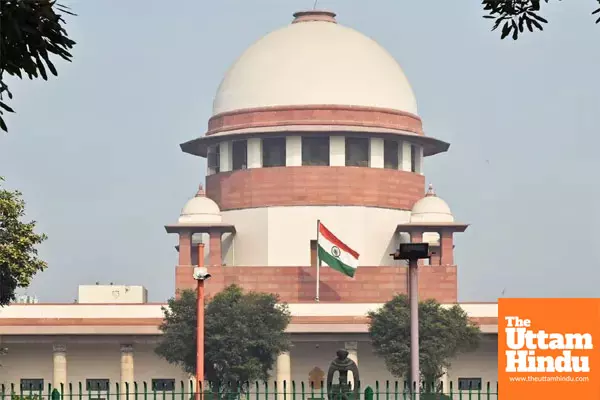
Supreme Court delivers historic ruling: President must decide on bills forwarded by Governor within three months

New Delhi (The Uttam Hindu): The Supreme Court has given a historic decision that the President will have to give his decision within three months on the bills sent by the Governor to the President. A bench of Justice JB Pardiwala and Justice R Mahadevan gave this decision, in which it was clarified that the action taken by the President under Article 201 of the Constitution comes under the purview of judicial review.
This important decision has come after the alleged delay in approving several bills by the Governor of Tamil Nadu. Hearing this matter, the Supreme Court rejected the decision of the Governor of Tamil Nadu. The court gave its decision on Tuesday, while the detailed order related to it was made public on Friday. In its order, the Supreme Court said that as per Article 201 of the Constitution, when the Governor sends a bill to the President, the President has to either give his assent to it or express his disapproval. However, no specific time limit has been prescribed in the Constitution for this process. In this context, the Supreme Court clearly stated that the President does not have the power of 'pocket veto', which means that he cannot keep his decision pending indefinitely.
The bench stressed that it is an established principle of law that even if a time limit is not specified in a provision, the power must be exercised within a reasonable time. The court said that the exercise of powers by the President under Article 201 cannot be treated as an aberration of this general principle of law. The Supreme Court also directed that if there is a delay of more than three months, then reasonable reasons for the same must be recorded and the concerned state must be informed about it.
The bench clearly directed, “We lay down that the President is required to take a decision on the Bills sent by the Governor for consideration within three months from the date of receipt of that reference.” The Supreme Court further said that if no action is taken within the prescribed time limit, the concerned state can approach the court. The court also clarified that if a Bill is stayed because of its constitutional validity, the executive should not play the role of a court and such cases should be referred to the Supreme Court under Article 143 of the Constitution.
The court said, “We clearly state that when a bill involves only legal issues, the hands of the executive are tied and only constitutional courts have the right to study and give suggestions on such matters.” This decision of the Supreme Court has come at a time when the court also said that Tamil Nadu Governor RN Ravi has acted illegally by not approving 10 bills passed by the DMK government. While setting a deadline for the governor to decide on the bills, the court also said that any kind of inaction can also come under judicial review.

